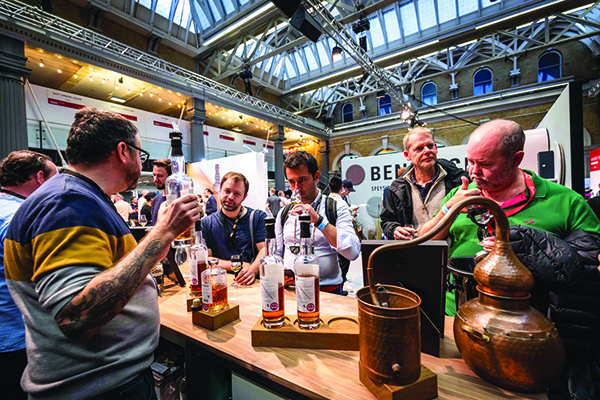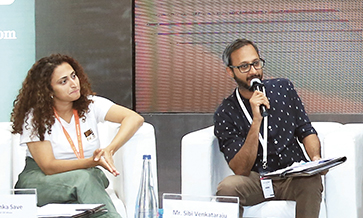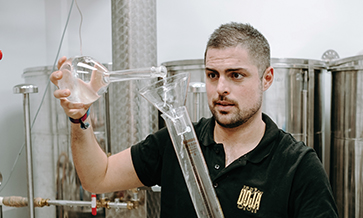For the alcobev industry, The Whisky Exchange (TWE) needs no elaborate introduction. Started by Indian immigrants in London a generation ago, it has reached the pinnacle of family-owned enterprise with a global digital footprint. From the burgeoning of supermarkets to the e-commerce boom, their liquor retail shops have tided over many business challenges and ridden on technology tailwinds.
Today, the world’s biggest online liquor retailer sells more than 60,000 bottles a month to customers in 55 countries. TWE also set up Elixir Distillers, the creator, blender and bottler of fine spirits. These are now exported to more than 20 countries. Vikram Achanta and Dhananjay Sardeshpande caught up with TWE’s Co-Founder and Managing Director, Sukhinder Singh, ahead of his participation in Brews&Spirits Expo, scheduled to be held in Bengaluru in September this year. Excerpts:
You are retailing 6,000 varieties of whiskies, single malts, and bourbons from around the world. More than 500 varieties of rum, 400 vodkas, 550 Cognacs/Armagnacs, 400 gins, 150 Tequilas, and 1,000 specialist liqueurs… What are the criteria that go into on-boarding brands and managing such a huge inventory?
We have always been liquid focused. I know this level of variety sounds like a huge amount, but we have always been selective, especially in terms of other spirits – otherwise we could have had double this quantity!
Whisky is slightly different because every expression is different. That’s what makes whisky so special and in demand, quantifying our specialism in this category.
Online retail or high street stores? Or a hybrid? What can you tell us about the future of retail?
In 99% of cases, a business adds the online side to its retail business. We are a little unique because, after selling our parent’s business, we re-started as a 100% online business back in 1999. It was very early in the e-commerce arena we know today.
Our first retail shop came 6 years later. I believe that both are important in our sector. As the variety of products in each category grows, the more the need for specialist retail establishments to talk to customers, to guide and educate them through the differences between each product.
Our industry is getting more and more complicated… 20 years ago we had 20 different gins in the world. Today there must be close to 2,000.
What are your five mantras for successful marketing?
- Deliver to the needs of the customer
- Build trust
- Be ahead of trends
- Focus on quality
- Be creative and different
Awareness and education through shows: the ‘why’ and ‘how’?
Shows are there for two reasons: they are a form of marketing and, more importantly, they are a form of education to the consumer. Educating is a form of showing expertise, which brings with it consumer loyalty.
What is your take on low- and no-alcohol beverages?
It is an important category for those who are not drinking at certain times and need a choice from sweet fizzy drinks. The new millennial consumer is more conscious of healthy living.

The Whisky Exchange organises focussed shows, such as whiskies as a form of marketing and educating consumers.
How has life changed for TWE after its acquisition by Pernod Ricard? What do you think were the main objectives/imperatives for Pernod to undertake this acquisition?
We (my brother Rajbir and I) sold the business in November 2021. Since then very little has changed. We are still the managing directors and continue to run the business as before. We agreed with Pernod Ricard that we would remain independent from their core business, so that our business could continue being run in the same way as before and with the same team.
The last 18 months have been about handing over to the new Managing Director who will take over from us. He is getting to know the business and the team with the goal of a smooth handover.
We still feel that it is our business and are working hard to ensure that very little changes, even though we know that to ensure it is the same business, a lot has to change.
Every industry is looking at D2C so they can understand the consumer and grow their own brands differently. In the drinks industry, Pernod Ricard seems to be ahead of the field in this arena.
What are the plans for the Tormore distillery, as also Portintruan?
We acquired Tormore in December 2022. We are still getting to know the distillery and how it lives and breathes. We do have plans to do a full renovation over the next few years, which will include a visitor’s centre.
Portintruan is currently being built and will start production at the end of 2024. We then have a long wait for the whisky to mature to an age where we can work with it to create a product.
We also have a second experimental distillery being built alongside the main one. Here we will do lots of fun stuff: different barley varieties, different yeast strains, different grains, as well as distilling rum.
A lot of new distilleries being set up around Scotland. You are also in the process of setting up one on Islay. Can a new distillery be compared to a tech start-up that disrupts the scenario for a marquee distillery?
I believe that many distillers today are obsessed with using different wood types to be innovative. They have forgotten how to release just good, clean-tasting whisky. We hope to go back to doing things in the good old-fashioned way and doing it well.
What (spirit) can displace or give Scotch a knock? Similar to what gin did to vodka and white rum. Does any current spirit or region have it in them?
I believe that other aged spirits, such as Cognac and rum, are in many ways in the same realm as Scotch. However, they lack the depth and complexity of flavour that Scotch can deliver.
Nearly every country of the world today is producing whisky, I believe Scotch’s threat is more world whisky than other categories. As we become a world more concerned with sustainability, more consumers will look for products made locally.
Scotch is the product that everyone compares to and has its own micro-climate, which will always make it unique amongst other whiskies.
You are among the biggest whisky collectors in the world. Could you let us in on what catches your interest? Any tips for those that would want to start/ have started a collection?
I look back and think how fortunate I was to start collecting in an era when some of the best whiskies in the world were released. Today I have around 10,000 bottles of whisk(e)y.
I am always on the lookout for older releases, pre-1980s, to add to my collection or a second bottle which I can open and drink someday.
When whisky started to become popular and an investment, many companies started releasing expressions purely for the collector. I am not a fan of these, where the liquid does not live up to the hype of its collectability.
I feel the market is at a high for those looking to invest. If you are a true whisky fan, then collect limited-release whiskies from the distilleries you like. That way at least you know what you are buying. And you can always drink them if you are fortunate enough to afford this!
Do you have an active interest in the Indian alcobev market? What areas might interest you and why?
I have always looked at the Indian market from my early days and wondered why there was no global brand from India. I always felt that Old Monk rum could have been that brand.
It pleases me that over the last few years so many new products are being launched around the world. India is the spice capital of the world, with so many amazing herbs, spices and local fruits. I am sure there is potential to create amazing pure spirits in every category.
The Indian whisky market has seen a flurry of single malt brand launches, ranging from Paul John, Amrut and Rampur to new entrants like Kamet, Indri and GianChand, and now also Diageo and Pernod with Godawan and Longitude 77 respectively. What would be your word of advice to these entrepreneurs/ companies on some key aspects to make their products/ brands unique?
Amrut was the first Indian single malt to be exported, and I am very proud that they are good friends. I was able to help them from the start. What I admire is that they did it the right way, with no shortcuts.
It is great that so many other Indian malts have launched since, and I am sure there will be dozens more because the country is one of the largest whisky consumers in the world.
What I am not a fan of is spiced Indian whiskies or those with additives and flavourings. Rum currently has this problem. There should be clear descriptions on the labels, so consumers know what they are getting. Otherwise, there is a danger that this category will not gain the respect it deserves. Consumers will always favour Scotch.
On a personal level, what does winning industry/ trade awards mean to you?
There are awards, and there are awards… Some of these are just a business: the more you pay the more you win! Others are more respectable, whether you pay to enter, or they award purely on merit.
We have won nearly every award in the industry: Drink Shop of the Year, Online Retailer of the Year, Show of the Year, Man of the Year, Innovator of the Year, Hall of Fame, etc.
It is always nice to be recognised, especially by the industry that you have done so much in – more so when you are from a different ethnicity and have had to work much harder than some of your competitors and colleagues in the industry.

The Whisky Exchange has won several accolades, including Drink Shop of the Year, Online Retailer of the Year, Show of the Year, Man of the Year, Innovator of the Year, Hall of Fame, etc.













